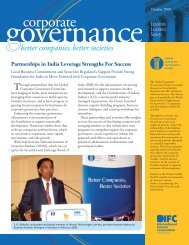Overview of Corporate Governance Issues for Co-operatives - IFC
Overview of Corporate Governance Issues for Co-operatives - IFC
Overview of Corporate Governance Issues for Co-operatives - IFC
You also want an ePaper? Increase the reach of your titles
YUMPU automatically turns print PDFs into web optimized ePapers that Google loves.
<strong>for</strong>m <strong>of</strong> co-operative is replicated elsewhere in China is not available. The authors pointout that the governance structures <strong>of</strong> Chinese co-<strong>operatives</strong> vary substantially in terms<strong>of</strong> equity, membership structures and size.Latin AmericaFor Latin American countries, co-<strong>operatives</strong> were also subject to strong governmentinfluence except <strong>for</strong> the countries <strong>of</strong> southern cone (Argentina, Chile, Brazil andUruguay) where European immigrants established more autonomous <strong>for</strong>ms <strong>of</strong>co-<strong>operatives</strong>. There are few studies available in English on the co-operative sector inLatin America and no comparative studies were located. Findings from two detailedcase studies <strong>of</strong> co-<strong>operatives</strong> in Bolivia and Mexico, however, provide some usefulinsights. Both emphasise the centrality <strong>of</strong> good corporate governance practices to thecommercial sustainability <strong>of</strong> the co-operative enterprises involved and can provide somevaluable examples <strong>of</strong> good practice.In Bolivia, a World Bank study considers the experience <strong>of</strong> the Sanguapac consumerco-operative which provides water supply and sanitation services. The research findingsconclude that a co-operative model <strong>for</strong> utilities can and does possess advantages overprivate and public sector models. Indeed this ownership and governance model has thecapacity to provide sustainable services at af<strong>for</strong>dable costs. Sanguapac has complexbut effective democratic structures and strong accountability mechanisms. The paperconcludes that:Successful co-<strong>operatives</strong> are normally those able to attract capable andcommitted board members, achieve a high degree <strong>of</strong> participation, isolate theirdecisions from political influence, and maintain an environment in whichcooperative values thrive (Ruiz-Meyer and van Ginneken 2006).In the case <strong>of</strong> Sanguapac, good quality management and governance have enabled itto overcome the problems faced by other co-operative water services providers, <strong>of</strong>whom the majority are conflict-ridden, inefficient and have financially weak.The second study looks at c<strong>of</strong>fee co-<strong>operatives</strong> in the Chiapas region <strong>of</strong> Mexico. Itexplores the impact <strong>of</strong> access to Fair Trade markets in both commercial andgovernance terms <strong>for</strong> the co-<strong>operatives</strong>. In a review <strong>of</strong> the experience <strong>of</strong> agriculturalco-<strong>operatives</strong> in developing countries, Mil<strong>for</strong>d argues that the co-operative models canhave benefits in terms <strong>of</strong> innovation, economies <strong>of</strong> scale, improving competition andincreasing social capital. The danger <strong>of</strong> external financial support and externally-drivendevelopment is that it can reduce levels <strong>of</strong> participation among the members, inhibit thedevelopment <strong>of</strong> social capital and make free riding more likely (Mil<strong>for</strong>d 2004).However Mil<strong>for</strong>d finds that support from Fair Trade has proven a more effective <strong>for</strong>m <strong>of</strong>external support <strong>for</strong> co-<strong>operatives</strong> than that provided by governments or NGOs. Thisappears to be due to the market-related nature <strong>of</strong> the support plus the fact that thePage 28


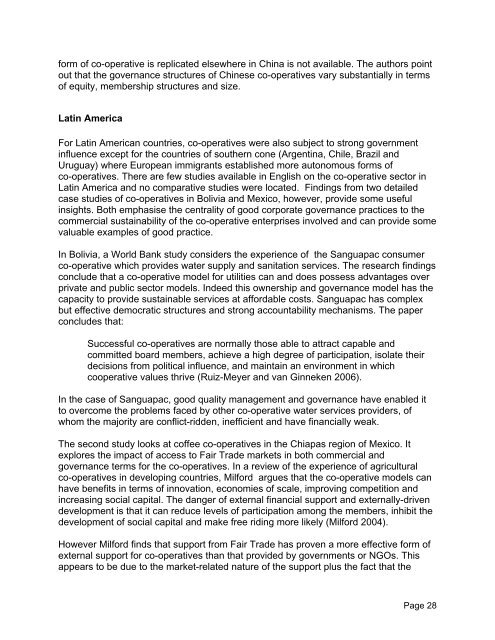
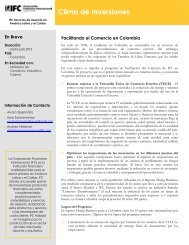
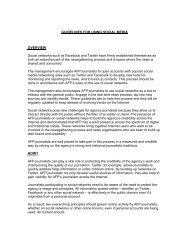
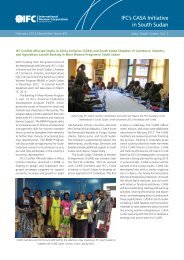
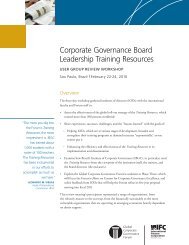

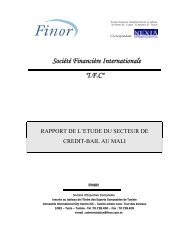
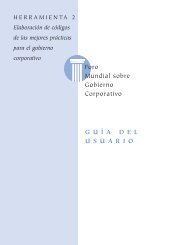

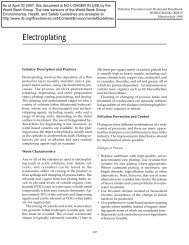

![Print a two-page fact sheet on this project [PDF] - IFC](https://img.yumpu.com/43449799/1/190x245/print-a-two-page-fact-sheet-on-this-project-pdf-ifc.jpg?quality=85)

